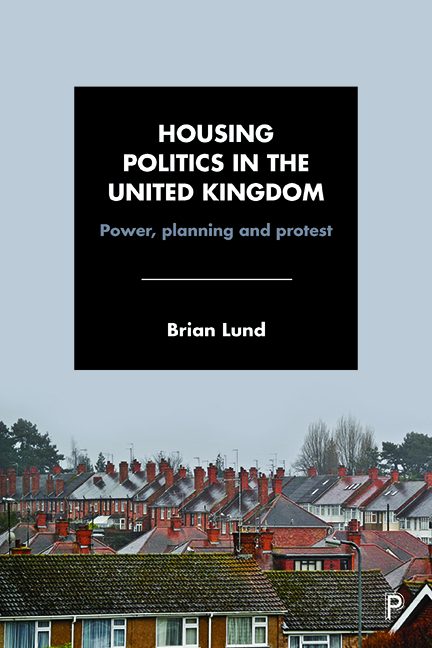Book contents
- Frontmatter
- Contents
- Acknowledgements
- Preface
- one Housing and politics
- two Land politics
- three Urban renewal: fencing the cities
- four Private landlords: ‘Rachmans’ or ‘residential property-owners’?
- five A property-owning democracy?
- six Eclipsing council housing
- seven Bending the ‘Third Arm’: politicians and housing associations
- eight Homelessness politics
- nine Devolution: where is the difference?
- ten Conclusion: power, planning and protest
- References
- Index
- Frontmatter
- Contents
- Acknowledgements
- Preface
- one Housing and politics
- two Land politics
- three Urban renewal: fencing the cities
- four Private landlords: ‘Rachmans’ or ‘residential property-owners’?
- five A property-owning democracy?
- six Eclipsing council housing
- seven Bending the ‘Third Arm’: politicians and housing associations
- eight Homelessness politics
- nine Devolution: where is the difference?
- ten Conclusion: power, planning and protest
- References
- Index
Summary
With rapid population growth, a long-term dearth in new housing construction, ‘generation rent’, ‘greenfield’ and green belt controversies, the ‘austerity’ agenda, and increasing homelessness, housing had a higher political profile in 2015 than at any time since the 1970s. When the 2015 general election hustings began, housing ranked eighth in the issues mentioned by electors ‘as the most important facing Britain today’ and its importance reached fifth place just before the election (Ipsos Mori, 2015a). The London Evening Standard (2015) said ‘housing is the big election issue for London’, and Shelter claimed that marginal seats nationwide were ‘more likely to be worse affected by the housing shortage, especially when it comes to the affordability of home ownership’ (Shelter, 2015a, p 1). However, political parties contest general elections in vivid colours, and after the election result declaration, it was clear that ‘non-policy’ issues, such as leader competence and a perceived threat to England from the Scottish National Party, had a major impact (Ross, 2015; Cowley and Kavanagh, 2016). Housing was not significant in influencing the overall 2015 general election outcome.
In contrast, housing was the overwhelming public concern in the 1945 general election campaign. In a 1945 Gallup poll, 54% of the electorate said the housing shortage was their top priority, well above the second concern, full employment, at only 13% (British Institute of Public Opinion Polls, 1945). A Mass Observation study carried out just before polling day claimed that ‘housing was mentioned so often that everything else became by comparison unimportant’ (Jones, 2000, p 100). Few houses had been built in the wartime years and the destruction or serious damage to 700,000 homes added to unmet needs in the interwar period. Demobbed soldiers, organised by the Communist Party through a secret committee of ex-servicemen known as the ‘Vigilantes’, began to squat in empty property and disused army camps. Labour's 1945 manifesto promised to ‘proceed with a housing programme with the maximum practical speed until every family in this island has a good standard of accommodation’. New housing would be planned and allocated according to ‘need’, with the central state controlling building materials and with new powers available to local government ‘to acquire land for public purposes wherever the public interest so requires’ (Labour Party, 1945).
- Type
- Chapter
- Information
- Housing Politics in the United KingdomPower, Planning and Protest, pp. 1 - 32Publisher: Bristol University PressPrint publication year: 2016



